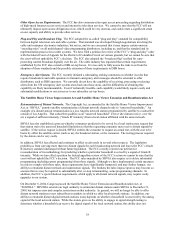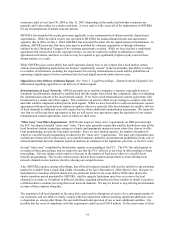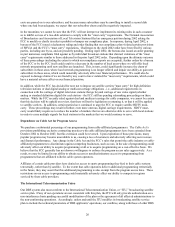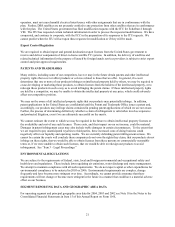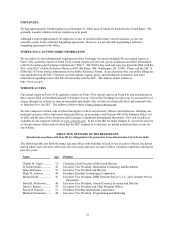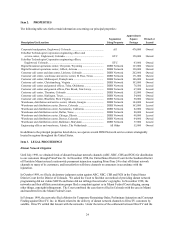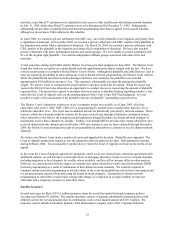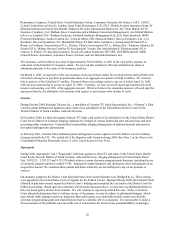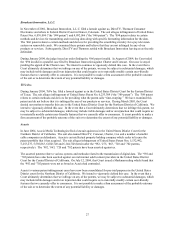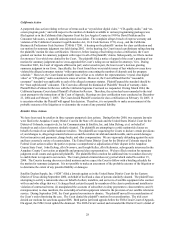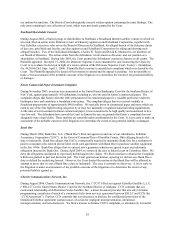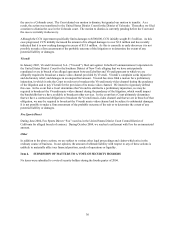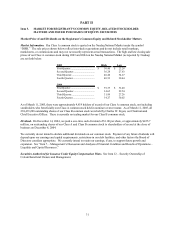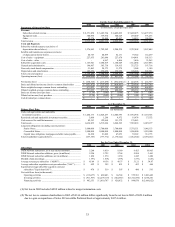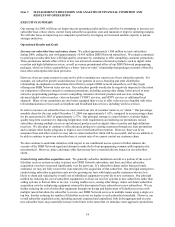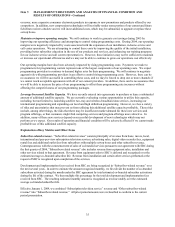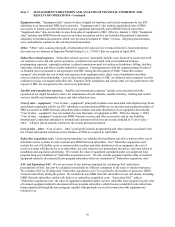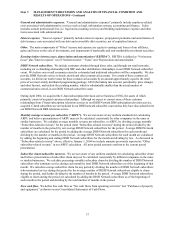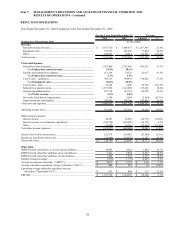Dish Network 2004 Annual Report Download - page 36
Download and view the complete annual report
Please find page 36 of the 2004 Dish Network annual report below. You can navigate through the pages in the report by either clicking on the pages listed below, or by using the keyword search tool below to find specific information within the annual report.28
California Action
A purported class action relating to the use of terms such as “crystal clear digital video,” “CD-quality audio,” and “on-
screen program guide,” and with respect to the number of channels available in various programming packages was
filed against us in the California State Superior Court for Los Angeles County in 1999 by David Pritikin and by
Consumer Advocates, a nonprofit unincorporated association. The complaint alleges breach of express warranty and
violation of the California Consumer Legal Remedies Act, Civil Code Sections 1750, et seq., and the California
Business & Professions Code Sections 17500 & 17200. A hearing on the plaintiffs’ motion for class certification and
our motion for summary judgment was held during 2002. At the hearing, the Court issued a preliminary ruling denying
the plaintiffs’ motion for class certification. However, before issuing a final ruling on class certification, the Court
granted our motion for summary judgment with respect to all of the plaintiffs’ claims. Subsequently, we filed a motion
for attorneys’ fees which was denied by the Court. The plaintiffs filed a notice of appeal of the court’s granting of our
motion for summary judgment and we cross-appealed the Court’s ruling on our motion for attorneys’ fees. During
December 2003, the Court of Appeals affirmed in part; and reversed in part, the lower court’s decision granting
summary judgment in our favor. Specifically, the Court found there were triable issues of fact whether we may have
violated the alleged consumer statutes “with representations concerning the number of channels and the program
schedule.” However, the Court found no triable issue of fact as to whether the representations “crystal clear digital
video” or “CD quality” audio constituted a cause of action. Moreover, the Court affirmed that the “reasonable
consumer” standard was applicable to each of the alleged consumer statutes. Plaintiff argued the standard should be
the “least sophisticated” consumer. The Court also affirmed the dismissal of Plaintiffs’ breach of warranty claim.
Plaintiff filed a Petition for Review with the California Supreme Court and we responded. During March 2004, the
California Supreme Court denied Plaintiff’s Petition for Review. Therefore, the action has been remanded to the trial
court pursuant to the instructions of the Court of Appeals. Hearings on class certification were conducted on December
21, 2004 and on February 7, 2005. The Court denied Plaintiff’s motion for class certification on February 10, 2005. It
is uncertain whether the Plaintiff will appeal this decision. Therefore, it is not possible to make an assessment of the
probable outcome of the litigation or to determine the extent of any potential liability.
Retailer Class Actions
We have been sued by retailers in three separate purported class actions. During October 2000, two separate lawsuits
were filed in the Arapahoe County District Court in the State of Colorado and the United States District Court for the
District of Colorado, respectively, by Air Communication & Satellite, Inc. and John DeJong, et al. on behalf of
themselves and a class of persons similarly situated. The plaintiffs are attempting to certify nationwide classes on
behalf of certain of our satellite hardware retailers. The plaintiffs are requesting the Courts to declare certain provisions
of, and changes to, alleged agreements between us and the retailers invalid and unenforceable, and to award damages
for lost incentives and payments, charge backs, and other compensation. We are vigorously defending against the suits
and have asserted a variety of counterclaims. The United States District Court for the District of Colorado stayed the
Federal Court action to allow the parties to pursue a comprehensive adjudication of their dispute in the Arapahoe
County State Court. John DeJong, d/b/a Nexwave, and Joseph Kelley, d/b/a Keltronics, subsequently intervened in the
Arapahoe County Court action as plaintiffs and proposed class representatives. We have filed a motion for summary
judgment on all counts and against all plaintiffs. The plaintiffs filed a motion for additional time to conduct discovery
to enable them to respond to our motion. The Court granted a limited discovery period which ended November 15,
2004. The Court is hearing discovery related motions and we expect the Court to follow with a briefing schedule for
the motion for summary judgment. It is not possible to make an assessment of the probable outcome of the litigation or
to determine the extent of any potential liability or damages.
Satellite Dealers Supply, Inc. (“SDS”) filed a lawsuit against us in the United States District Court for the Eastern
District of Texas during September 2000, on behalf of itself and a class of persons similarly situated. The plaintiff was
attempting to certify a nationwide class on behalf of sellers, installers, and servicers of satellite equipment who contract
with us and who allege that we: (1) charged back certain fees paid by members of the class to professional installers in
violation of contractual terms; (2) manipulated the accounts of subscribers to deny payments to class members; and (3)
misrepresented, to class members, the ownership of certain equipment related to the provision of our satellite television
service. During September 2001, the Court granted our motion to dismiss. The plaintiff moved for reconsideration of
the Court’s order dismissing the case. The Court denied the plaintiff’s motion for reconsideration. The trial court
denied our motions for sanctions against SDS. Both parties perfected appeals before the Fifth Circuit Court of Appeals.
On appeal, the Fifth Circuit upheld the dismissal. The Fifth Circuit vacated and remanded the District Court’s denial of


